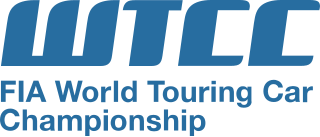
Sports car racing is a form of motorsport road racing which utilises sports cars that have two seats and enclosed wheels. They may be purpose-built (Prototype) or related to road-going models. Broadly speaking, sports car racing is one of the main types of circuit auto racing, alongside open-wheel single seater racing, touring car racing and stock car racing. Sports car races are often endurance races that are run over relatively large distances, and there is usually a larger emphasis placed on the reliability and efficiency of the car than in some of the other types of auto racing. The FIA World Endurance Championship is an example of a sports car racing series.

The World Rally Championship is the highest level of global competition in the motorsport discipline of rallying, governed and organised by the FIA. There are separate championships for drivers, co-drivers and manufacturers, with a new teams championship added in 2021. The series currently consists of 12 two to three-day events driven on surfaces ranging from gravel and tarmac to snow and ice. Each rally is usually split into 15–25 special stages which are run against the clock on closed roads.

The Kwik Fit British Touring Car Championship is a touring car racing series held each year in the United Kingdom, currently organised and administered by TOCA. It was established in 1958 as the British Saloon Car Championship and was renamed as the British Touring Car Championship for the 1987 season. The championship, currently running Next Generation Touring Car regulations, has been run to various national and international regulations over the years including FIA Group 2, FIA Group 5, FIA Group 1, FIA Group A, FIA Super Touring and FIA Super 2000. A lower-key Group N class for production cars ran from 2000 until 2003.
Super Touring, Class 2 or Class II was a motor racing Touring Cars category defined by the Fédération Internationale de l'Automobile (FIA) for national touring car racing in 1993. It was based on the "2 litre Touring Car Formula" created for the British Touring Car Championship (BTCC) in 1990. The FIA organised a World Cup for the category each year from 1993 to 1995, and adopted the term "Super Tourer" from 1995.

The FIA GT Championship was a sports car racing series organized by the Stéphane Ratel Organisation (SRO) at the behest of the Fédération Internationale de l'Automobile (FIA). The championship was mostly concentrated in Europe, but throughout the years has visited other continents including Asia and South America. At the end of 2009, the championship was replaced by the FIA GT1 World Championship, which morphed into the FIA GT Series for 2013.

The FIA World Touring Car Championship was an international touring car championship promoted by Eurosport Events and sanctioned by the Fédération Internationale de l'Automobile (FIA). It has had several different incarnations, including a single season in 1987 as the World Touring Car Championship and most recently a world championship (WTCC) that has run between 2005 and 2017. Following the 2017 season, an agreement was reached for the FIA WTCC to become FIA WTCR and use the TCR technical regulations.
The European Touring Car Championship was an international touring car racing series organised by the FIA. It had two incarnations, the first one between 1963 and 1988, and the second between 2000 and 2004. In 2005 it was superseded by the World Touring Car Championship, and replaced by the European Touring Car Cup between 2005 and 2017 when became also defunct.

The 2006 World Touring Car Championship season was the third season of FIA World Touring Car Championship motor racing. It featured a ten event, twenty race series which commenced on 2 April 2006 and ended on 19 November. The series was open to Super 2000, Diesel 2000 and Super Production Cars, with two titles awarded, the FIA World Touring Car Champion for Drivers and the FIA World Touring Car Champion for Manufacturers. Andy Priaulx won the Drivers title and BMW won the Manufacturers award.

The 2005 World Touring Car Championship was the second season of World Touring Car Championship motor racing, and the first since 1987. It featured the 2005 FIA World Touring Car Championship which was contested over a ten event, twenty race series which commenced on 10 April and ended on 20 November. The championship was open to Super 2000 cars, Diesel 2000 cars and Super Production cars as defined by the FIA. Andy Priaulx won the Drivers' Championship and BMW won the Manufacturers' title.
The 2007 World Touring Car Championship season was the 4th season of FIA World Touring Car Championship motor racing. The championship, which commenced on 11 March and ended on 18 November, after twenty-two races, was open to Super 2000 Cars, Diesel 2000 Cars and Super Production Cars as defined by the relevant FIA regulations. The Drivers' Championship was won by Andy Priaulx and the Manufacturers' Championship by BMW.

Super 2000 is an FIA powertrain specification used in the World Rally Championship, the British Touring Car Championship, the World Touring Car Championship, and other touring car championships. The engines were originally 2 L naturally aspirated, and later being also allowed 1.6 L turbocharged units producing approximately 280 bhp.

The 2008 World Touring Car Championship season was the fifth World Touring Car Championship season, the fourth since its 2005 return. It began on 2 March, and ended on 16 November, after twenty-four races. The championship, which was open to Super 2000 Cars and Diesel 2000 Cars, was composed of the FIA World Touring Car Championship for Drivers and the FIA World Touring Car Championship for Manufacturers.

The 2009 World Touring Car Championship season was the sixth FIA World Touring Car Championship season, the fifth since its 2005 return. It began on 8 March, and ended on 22 November, after twenty-four races. The championship, which was reserved for Super 2000 Cars and Diesel 2000 Cars, comprised two titles, the FIA World Touring Car Champion for Drivers and the FIA World Touring Car Champion for Manufacturers.

The FIA European Touring Car Cup was an annual touring car racing event, which had been held at various locations across Europe from 2005 to 2017. Unlike in previous years where it was a one-off event, in 2010 the series was a three round event.
Group 7 was a set of regulations for automobile racing created by the Commission Sportive Internationale (CSI), a division of the modern Fédération Internationale de l'Automobile.

The 2010 World Touring Car Championship season was the seventh season of the FIA World Touring Car Championship, and the sixth since its 2005 return. It began with the Race of Brazil at Curitiba on 7 March and ended with the Guia Race of Macau at the Guia Circuit on 21 November, after twenty-two races at eleven events. The championship was open to both Super 2000 and Diesel 2000 cars.
The FIA World Rally Championship-2 or WRC-2, is a support championship of the World Rally Championship. The calendar consists of the same rallies and stages as the main class and crews usually compete immediately after. WRC-2 is limited to production-based cars homologated under Rally2 rules. Like the main class, teams must enter the cars and privateers cannot enter directly. There are separate championship titles awarded to Teams, Drivers and Co-Drivers. The current format began in 2013 with the introduction of Group R.

The 2011 World Touring Car Championship season was the eighth season of the FIA World Touring Car Championship, and the seventh since its 2005 return. The championship, which was open to Super 2000 cars and Diesel 2000 cars, began with the Race of Brazil at Curitiba on 20 March and ended with the Guia Race of Macau at the Guia Circuit on 20 November, after twelve events and twenty-four races.

Group GT3, known technically as Cup Grand Touring Cars and commonly referred to as simply GT3, is a set of regulations maintained by the Fédération Internationale de l'Automobile (FIA) for grand tourer racing cars designed for use in various auto racing series throughout the world. The GT3 category was initially created in 2005 by the SRO Group as a third rung in the ladder of grand touring motorsport, below the Group GT1 and Group GT2 categories which were utilized in the SRO's FIA GT Championship, and launched its own series in 2006 called the FIA GT3 European Championship. Since then, Group GT3 has expanded to become the de facto category for many national and international grand touring series, although some series modify the ruleset from the FIA standard. By 2013, nearly 20 automobile manufacturers have built or been represented with GT3 machines.
Grand Touring Endurance, shortened to GTE or GTLM, is a set of regulations maintained by the Automobile Club de l'Ouest (ACO) for grand tourer racing cars used in the 24 Hours of Le Mans and its associated series. The class was formerly referred to as Group GT2 when used in the context of the 24 Hours of Le Mans to distinguish it from the faster, more powerful GT1 cars.














